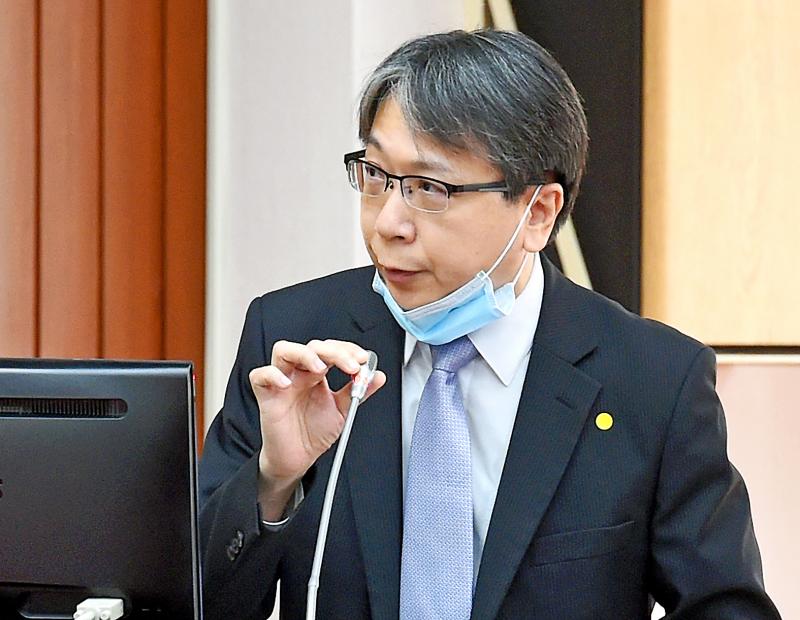The Chinese government’s proposed national security law for Hong Kong could jeopardize the right to personal freedom of Taiwanese in the region, National Security Council (NSC) Deputy Secretary-General Tsai Ming-yen (蔡明彥) said yesterday.
China’s National People’s Congress on Friday last week unveiled a proposal to enact a Hong Kong security law.
The proposed “enforcement mechanisms,” which are expected to ban treason, subversion and sedition, are being introduced in response to last year’s pro-democracy protests in the territory.

Photo: Chu Pei-hsiung, Taipei Times
If Beijing passes the controversial law, it would have broken its promise to respect the territory’s autonomy under its “one country, two systems” model, Tsai said in response to a question from Democratic Progressive Party (DPP) Legislator Wu Yu-chin (吳玉琴) at a meeting of the legislature’s Finance Committee in Taipei.
The council is concerned that the law could affect the personal freedom of Taiwanese, such as businesspeople or workers at non-governmental organizations, when they engage in interviews or other exchanges in the region, Tsai said.
The legislation would overturn the special status — both legally and politically — that China has assigned to Hong Kong as a Special Administrative Region, he said.
Asked by Chinese Nationalist Party (KMT) Legislator Lai Shyh-bao (賴士葆) whether the proposed law would impact Hong Kong’s financial markets and lead to capital flowing to Taiwan, Tsai said that it could have that effect.
As investors are based in the territory due to its special status, passage of the proposed legislation could result in the flight of foreign capital, as well as talent, Tsai said, adding that the council would pay close attention to developments.
The council would also need to review whether capital investments from Hong Kong would need to be redefined as Chinese capital, Tsai said in response to a query from DPP Legislator Kao Chia-yu (高嘉瑜).
Wu urged the government to respond with caution to the proposed law — which would give the Hong Kong government the power to detain or incarcerate individuals on subversion or “other unwarranted charges” — to safeguard the rights of Taiwanese in the territory.
Beijing has never given up on annexing Taiwan, she said, adding that it has waged several “wars” against the nation, including “public opinion and legal warfare.”
Taiwan every month is subject to about 30 million cyberattacks likely orchestrated by the Chinese Communist Party, and although the interception rate is as high as 99.99 percent, the 0.01 percent not intercepted could be a loophole, she said, citing Executive Yuan data.
From the increasing and intensified number of cyberattacks on Taiwan, it is clear that Beijing has created a “nationwide cyberarmy,” Tsai said.
The council would stay abreast of cybersecurity developments in Taiwan and other nations to ensure the best defensive policies are implemented when required, he said.
Additional reporting by CNA

INVESTIGATION: The case is the latest instance of a DPP figure being implicated in an espionage network accused of allegedly leaking information to Chinese intelligence Democratic Progressive Party (DPP) member Ho Jen-chieh (何仁傑) was detained and held incommunicado yesterday on suspicion of spying for China during his tenure as assistant to then-minister of foreign affairs Joseph Wu (吳釗燮). The Taipei District Prosecutors’ Office said Ho was implicated during its investigation into alleged spying activities by former Presidential Office consultant Wu Shang-yu (吳尚雨). Prosecutors said there is reason to believe Ho breached the National Security Act (國家安全法) by leaking classified Ministry of Foreign Affairs information to Chinese intelligence. Following interrogation, prosecutors petitioned the Taipei District Court to detain Ho, citing concerns over potential collusion or tampering of evidence. The

‘FORM OF PROTEST’: The German Institute Taipei said it was ‘shocked’ to see Nazi symbolism used in connection with political aims as it condemned the incident Sung Chien-liang (宋建樑), who led efforts to recall Democratic Progressive Party (DPP) Legislator Lee Kun-cheng (李坤城), was released on bail of NT$80,000 yesterday amid an outcry over a Nazi armband he wore to questioning the night before. Sung arrived at the New Taipei City District Prosecutors’ Office for questioning in a recall petition forgery case on Tuesday night wearing a red armband bearing a swastika, carrying a copy of Adolf Hitler’s Mein Kampf and giving a Nazi salute. Sung left the building at 1:15am without the armband and apparently covering the book with a coat. This is a serious international scandal and Chinese

Seventy percent of middle and elementary schools now conduct English classes entirely in English, the Ministry of Education said, as it encourages schools nationwide to adopt this practice Minister of Education (MOE) Cheng Ying-yao (鄭英耀) is scheduled to present a report on the government’s bilingual education policy to the Legislative Yuan’s Education and Culture Committee today. The report would outline strategies aimed at expanding access to education, reducing regional disparities and improving talent cultivation. Implementation of bilingual education policies has varied across local governments, occasionally drawing public criticism. For example, some schools have required teachers of non-English subjects to pass English proficiency

TRADE: The premier pledged safeguards on ‘Made in Taiwan’ labeling, anti-dumping measures and stricter export controls to strengthen its position in trade talks Products labeled “made in Taiwan” must be genuinely made in Taiwan, Premier Cho Jung-tai (卓榮泰) said yesterday, vowing to enforce strict safeguards against “origin laundering” and initiate anti-dumping investigations to prevent China dumping its products in Taiwan. Cho made the remarks in a discussion session with representatives from industries in Kaohsiung. In response to the US government’s recent announcement of “reciprocal” tariffs on its trading partners, President William Lai (賴清德) and Cho last week began a series of consultations with industry leaders nationwide to gather feedback and address concerns. Taiwanese and US officials held a videoconference on Friday evening to discuss the